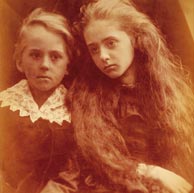Ghosts in the Nursery
Henry James leaves his stories open to his readers interpretations. That is the source of their intrigue. The ‘Turn of the Screw’ is his most famous and most chilling novel, but why? Is it because it explores, albeit obliquely, that most horrific of topics, the loss of innocence.
The governess is both an unreliable and uninformed narrator and as such gives the tale its edgy somewhat hysterical character. She has been employed by their uncle to look after Flora and Miles’, in effect to become their parent. We assume their real parents have died. On the day of her departure for Bly, the large country house, where they live, she is given a letter saying that Miles has been expelled from school for some undisclosed misdemeanour.
She meets the children and is instantly charmed. They are polite, intelligent and kind, but there is something a little too knowing about them. She leans from the housekeeper, Miss Grose, that both Miss Jessel, her predecessor and Peter Quint the butler, died shortly after leaving Bly, but she sees what Miss Grose identifies as apparitions of them in the grounds and the house. Jessel and Quint seem to have some malign hold over the children, and the governess fears for their safety. What on earth has been going on? There are dark hints of sexual abuse. The apparitions increase and the children appear to collude in the deception but by the end we begin to wonder whether they are just creations of the governess’s overheated imagination. Flora is taken away for her own safety by Miss Grose. Miles remains with the governess but dies in her arms while she is trying to prevent him from looking at Quint.
The Victorians were very interested in ghosts and long exposures required to take contemporary photographic images reated ‘evidence’ of all kinds of ephemera and phantasms; lost objects. The children, we assume, had already experienced loss, first of their parents, then of their uncle and the servants he employed to look after them. The governess, we learn, has also experienced loss and perhaps her neediness creates strong attachments first with the absent uncle and with the children, but does she also create ghosts? Are not only Peter Quint and Miss Jessel but also Ms Grose and even the children projections of her fearful imagination?
If what happens cannot be processed (with the aid of a parental figure), then they become very frightening. Is this fear what the governess experiences and transfers to the children? Benjamin Britten, who wrote an opera of the same name, had a deep empathy with the character, Miles. He was sent away by his beloved mother to boarding school where he was abused. But did he later abuse his choir boys, as suggested by Alan Bennett’s new play, A Habit of Art?
The richness of James’s story lies in the gaps, which create space for the authors interpretations. There are links with mourning and melancholia, for example. Mourning is a process of working through memories until they wear away, but in melancholia, the aggrieved identifies with the lost object (the ghost) and blames himself. ‘The shadow of the object falls on the ego’. The tendency for the melancholic to identify with the person who has let them down is known in psychoanalytical terminology as projective identification. This process defends against the realities of separation by assuming the absent identity; in other words, becoming the ghost. We sense the horror of this in the two innocents.
Melancholia may be thought of as a condition of too much empathy, too much forgiveness. It’s a disease of therapists; too much ruth; ruthful instead of ruthless. The one who is lost remains as a ghost inside us and because we can’t evict them, we have to suffer. Natasha Kampusch was kidnapped as a child and held in a cellar for 8 years but felt protective towards her kidnapper and guilty about escaping and telling. Children often think its their fault when parents split up. Lovers frequently blame themselves when they are rejected because they can’t bear to lose their beloved.
Ghosts in the Nursery was an event organised by the Harry Guntrip Psychotherapy Trust on October 9th to coincide with a performance of Britten’s ‘A Turn of the Screw’ by Opera North.



